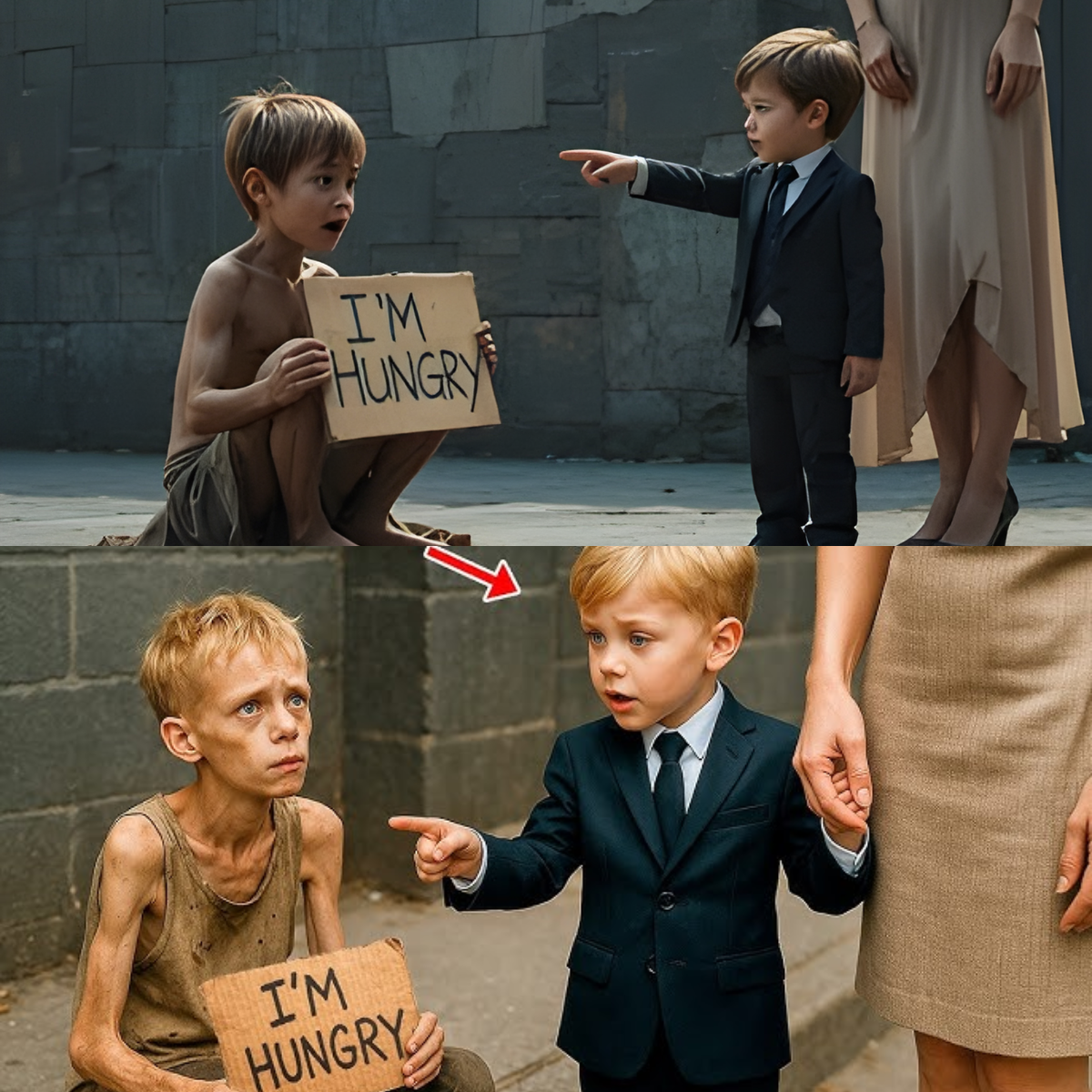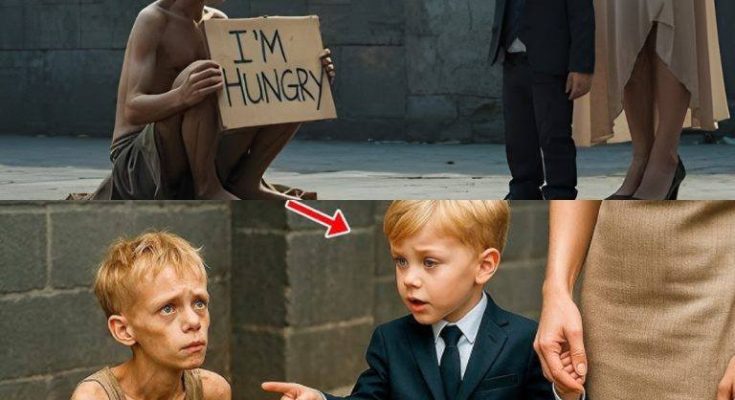“Mom, it’s my brother!” the boy said to his millionaire mother, and then… “Sometimes life seems like a movie,” he used to think. But nothing prepared me for the day I found myself standing on the street outside my father’s birthday party. – TAMMY
The Harris family had always projected an image of wealth, success, and control. With patriarch Alfonso Harris, a prominent real estate mogul, and his elegant wife Penelope, their life seemed perfect: mansions, luxury cars, and exclusive parties adorned their name. Their son, Ashton Harris, grew up in this refined world: private schools, summer trips abroad, and all the comforts money could buy.

But beneath the shiny surface, a hidden truth was waiting to emerge. And when it did, it came in the voice of a child.
“Mom, he’s my brother!”
Those words, shouted by Ashton in front of his mother after a chance encounter, sparked a scandal that has shaken not only the Harris family, but also high society itself.
A birthday party, a street, and a stranger’s gaze
The story begins with Alfonso Harris’s lavish birthday celebration. Politicians, businessmen, and celebrities filled the mansion with laughter and expensive wine. But for young Ashton, the night felt stifling. Wanting to escape the sea of fake smiles, he sneaked out.
There, on the quiet street beyond the golden gates, Ashton froze. Another boy stared back at him: the same age, with the same blue eyes, the same sharp features. But where Ashton wore tailored clothes, this boy’s shirt was torn, his jeans stained, and his body bore the marks of hunger.
At first, Ashton thought it was a trick. A mirror. A joke. But then the boy blinked. It was real.
“Who are you?” Ashton whispered.

“Luke,” the boy replied in a cautious, almost wild voice.
They shook hands. For a fleeting moment, it seemed like fate. Then, Penelope’s voice called Ashton from inside the house. Like a frightened animal, Luke slipped away into the night.
A mother’s nightmare
That night, Penelope Harris tossed and turned in her sleep; her whispers filled the mansion with unease. She spoke of “two babies, not one.” Ashton, listening from the hallway, froze. His father, Alfonso, dismissed it as his imagination. However, Ashton noticed how his mother hugged him more tightly the next morning, her face pale, as if she feared a long-buried truth was resurfacing.
Hazel and the Quest
Unable to forget the encounter, Ashton confessed to his best friend, Hazel Carter, heiress to another wealthy family. Hazel, far from mockingly, leaned in curiously.
“You have to find it again,” he said simply.
Hazel recruited her family’s chauffeur, Theodore, who reluctantly agreed to help. The three of them drove through the streets where Ashton had seen the boy. Hours later, fate brought them back to the same block. There, next to a dumpster, hunched over discarded food, was Luke.
Hazel gasped. “They’re identical.”
The Confession
This time, Ashton persuaded Luke to talk. What he heard shattered the cocoon of his privileged life.
Luke explained that he had grown up abandoned, raised by strangers struggling to survive. The kind souls who had protected him eventually died, leaving him to fend for himself on the streets. He never knew his parents—only hunger, loss, and the occasional kindness from strangers.
And then Hazel noticed something that made her blood run cold: a small, crescent-shaped birthmark on Luke’s stomach, identical to Ashton’s.
“They’re not just the same,” Hazel whispered. “They’re siblings.”
The Shocking Confrontation
When Ashton brought Luke to the Harris estate, chaos erupted. Penelope burst into tears when she saw the birthmark. Her worst secret, one she’d buried for over a decade, was shining brightly before her.
To her horrified son, she admitted what she had kept hidden: years earlier, during the difficult birth of their twins, Alfonso had insisted they could only have one child. The family’s reputation, he argued, couldn’t withstand the scandal, the complications, or the burden of raising two. In a decision that now haunts her, Penelope allowed one baby, Luke, to be taken from her.
“I thought he was gone forever,” she cried. “But he survived. May God forgive me… he survived.”
Alfonso’s denial
Alfonso Harris, however, refused to recognize Luke.
“Ridiculous,” he told reporters when the news broke. “That boy is an imposter. We have one son, not two. Someone is trying to blackmail us.”
But photographs of Ashton and Luke together told a different story: two children, identical down to their birthmarks. Social media was filled with hashtags like #HarrisTwins, #LostBrother, and #JusticeForLuke.
Public Outrage
The media flooded the Harris estate. Was Luke really the long-lost twin? If so, why had he been abandoned? The questions sparked a nationwide moral debate.
“How can a family with billions waste its own blood?” one headline asked.
Protests erupted outside Harris’s corporate headquarters. Activists demanded accountability, calling Luke’s story a symbol of the gap between rich and poor.
Ashton’s Decision
For Ashton, the revelation was life-changing. His comfortable world suddenly felt empty. His friendship with Hazel deepened…
The Harris family had always projected an image of wealth, success, and control. With patriarch Alfonso Harris, a prominent real estate mogul, and his elegant wife Penelope, their life seemed perfect: mansions, luxury cars, and exclusive parties adorned their name. Their son, Ashton Harris, grew up in this refined world: private schools, summer trips abroad, and all the comforts money could buy.

But beneath the shiny surface, a hidden truth was waiting to emerge. And when it did, it came in the voice of a child.
“Mom, he’s my brother!”
Those words, shouted by Ashton in front of his mother after a chance encounter, sparked a scandal that has shaken not only the Harris family, but also high society itself.
A birthday party, a street, and a stranger’s gaze
The story begins with Alfonso Harris’s lavish birthday celebration. Politicians, businessmen, and celebrities filled the mansion with laughter and expensive wine. But for young Ashton, the night felt stifling. Wanting to escape the sea of fake smiles, he sneaked out.
There, on the quiet street beyond the golden gates, Ashton froze. Another boy stared back at him: the same age, with the same blue eyes, the same sharp features. But where Ashton wore tailored clothes, this boy’s shirt was torn, his jeans stained, and his body bore the marks of hunger.
At first, Ashton thought it was a trick. A mirror. A joke. But then the boy blinked. It was real.
“Who are you?” Ashton whispered.

“Luke,” the boy replied in a cautious, almost wild voice.
They shook hands. For a fleeting moment, it seemed like fate. Then, Penelope’s voice called Ashton from inside the house. Like a frightened animal, Luke slipped away into the night.
A mother’s nightmare
That night, Penelope Harris tossed and turned in her sleep; her whispers filled the mansion with unease. She spoke of “two babies, not one.” Ashton, listening from the hallway, froze. His father, Alfonso, dismissed it as his imagination. However, Ashton noticed how his mother hugged him more tightly the next morning, her face pale, as if she feared a long-buried truth was resurfacing.
Hazel and the Quest
Unable to forget the encounter, Ashton confessed to his best friend, Hazel Carter, heiress to another wealthy family. Hazel, far from mockingly, leaned in curiously.
“You have to find it again,” he said simply.
Hazel recruited her family’s chauffeur, Theodore, who reluctantly agreed to help. The three of them drove through the streets where Ashton had seen the boy. Hours later, fate brought them back to the same block. There, next to a dumpster, hunched over discarded food, was Luke.
Hazel gasped. “They’re identical.”
The Confession
This time, Ashton persuaded Luke to talk. What he heard shattered the cocoon of his privileged life.
Luke explained that he had grown up abandoned, raised by strangers struggling to survive. The kind souls who had protected him eventually died, leaving him to fend for himself on the streets. He never knew his parents—only hunger, loss, and the occasional kindness from strangers.
And then Hazel noticed something that made her blood run cold: a small, crescent-shaped birthmark on Luke’s stomach, identical to Ashton’s.
“They’re not just the same,” Hazel whispered. “They’re siblings.”
The Shocking Confrontation
When Ashton brought Luke to the Harris estate, chaos erupted. Penelope burst into tears when she saw the birthmark. Her worst secret, one she’d buried for over a decade, was shining brightly before her.
To her horrified son, she admitted what she had kept hidden: years earlier, during the difficult birth of their twins, Alfonso had insisted they could only have one child. The family’s reputation, he argued, couldn’t withstand the scandal, the complications, or the burden of raising two. In a decision that now haunts her, Penelope allowed one baby, Luke, to be taken from her.
“I thought he was gone forever,” she cried. “But he survived. May God forgive me… he survived.”
Alfonso’s denial
Alfonso Harris, however, refused to recognize Luke.
“Ridiculous,” he told reporters when the news broke. “That boy is an imposter. We have one son, not two. Someone is trying to blackmail us.”
But photographs of Ashton and Luke together told a different story: two children, identical down to their birthmarks. Social media was filled with hashtags like #HarrisTwins, #LostBrother, and #JusticeForLuke.
Public Outrage
The media flooded the Harris estate. Was Luke really the long-lost twin? If so, why had he been abandoned? The questions sparked a nationwide moral debate.
“How can a family with billions waste its own blood?” one headline asked.
Protests erupted outside Harris’s corporate headquarters. Activists demanded accountability, calling Luke’s story a symbol of the gap between rich and poor.
Ashton’s Decision
For Ashton, the revelation was life-changing. His comfortable world suddenly felt empty. His friendship with Hazel deepened…



